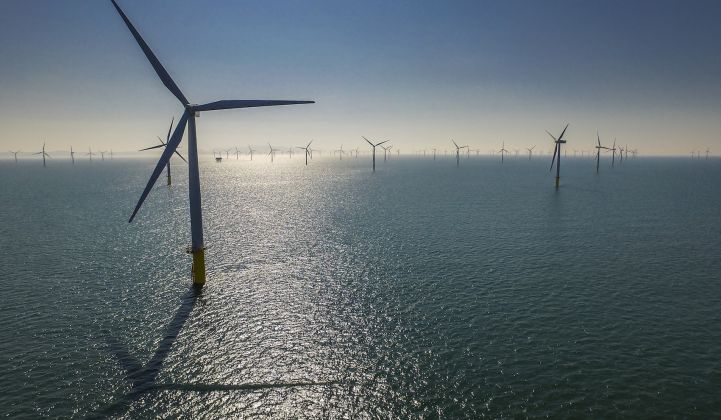Europe’s offshore wind sector saw an uptick in activity this month as the U.K. unveiled development zone plans and France launched a 500-megawatt tender.
In the U.K., the Crown Estate, which manages seafloor leases, released details of the areas it is intending to open up in the country’s upcoming fourth offshore wind leasing round.
The round could see potential U.K. offshore capacity going from 6 gigawatts to 7 gigawatts as developers get access to waters of up to 60 meters (197 feet) for fixed-foundation turbines.
Developers said they are confident of their ability to breach a previous water depth limit of 50 meters (164 feet), according to the leasing body.
The Crown Estate said it had already picked five regions for leasing on the basis that they are technically feasible, included sufficiently large areas of available seabed for offshore wind and are not affected by development constraints such as nearby shipping lanes.
The areas selected included parts of the Dogger Bank, the Irish Sea, the southern North Sea, and the seabed off the coast of East Anglia and North Wales.
Four other regions, off Yorkshire, the Wash, the South East and Anglesey, would be looked at further in advance of Round 4, said the Crown Estate.
It also confirmed seabed regions off Durham, the Thames, Kent, the South West, the English and Welsh Bristol Channel, Cardigan Bay, Northern Ireland and west of the Isle of Wight would not go into Round 4 because of “significant development constraints.”
The Crown Estate said it would share further details of the Round 4 tender design on Nov. 26.
Jonny Boston, senior development manager at the Crown Estate, said in a press release: “We’ve undertaken significant analysis to help build a detailed picture of seabed resource and constraints around England, Wales and Northern Ireland. We will continue to refine this work.”
Meanwhile, across the Channel, French Prime Minister Edouard Philippe and ecological transition minister François de Rugy announced a tender for 500 megawatts of offshore wind capacity off the coast of Dunkirk.
France’s energy regulator, the Commission de Régulation de l’Énergie (CRE), had already preselected 10 bidders for the tender, which is due to last four months.
Most of the bids are from high-profile offshore wind developers, including Boralex, DEME, EDF, EDPR, Enbridge, Engie, Equinor, Iberdrola, Innogy, Parkwind, Quadran, RES, Shell and Vattenfall.
Taken together, the U.K. and French developments appear to be good news for European offshore wind. But the cause for celebration was tempered in both cases.
In the U.K., enthusiasm over the details of Round 4 was dampened when the Department for Business, Energy & Industrial Strategy published a draft budget notice for its third contracts-for-difference auction, which is set to be held in May 2019.
Only £60 million ($77 million) has been allocated to support offshore wind projects that would be commissioned between 2023 and 2025.
The French tender announcement, meanwhile, was overshadowed by news that the government had decided to slash support for previously authorized offshore wind farms by 25 percent.
Between 2012 and 2014, France awarded tenders for six offshore wind projects with feed-in tariffs of around €200 ($228 at today’s rates) per megawatt-hour, for 20 years.
According to Reuters, “public opposition to wind farms has long delayed the projects, and since then, prices for international offshore wind power have more than halved. French energy regulator CRE has said the projects were too costly.”
With some offshore wind farms in Europe now being built without any subsidies at all, developers EDF, Iberdrola and Engie were said to be happy to get a revised feed-in tariff of €150 ($171) per megawatt-hour.
French officials believe the next tender will require much lower subsidy levels, or possibly none at all. Chris Golightly, an independent offshore wind energy researcher and consultant based in Brussels, said support levels are still higher than needed. Large government subsidies are “not the way to go," he said.




